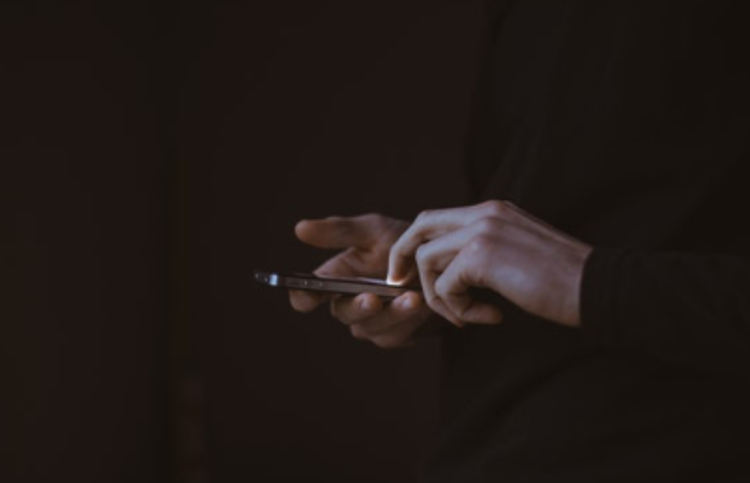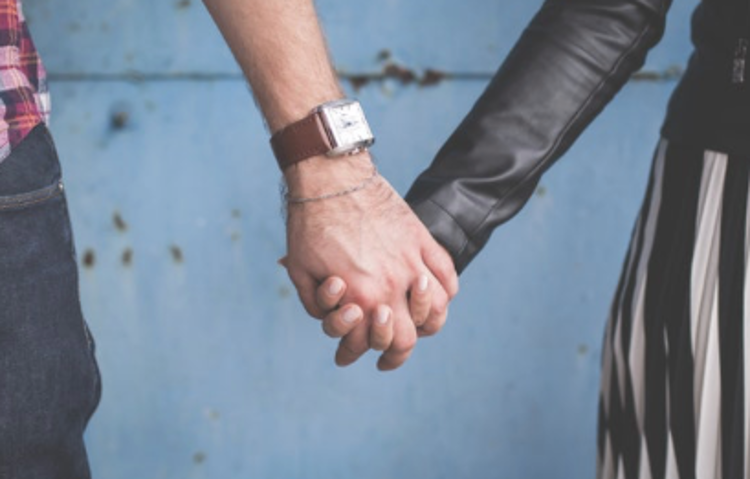Swipe: The Gendered Landscape of Online Dating Culture
Some names have been changed to protect privacy.
I sat at the bar waiting for Bru twenty minutes past the time we had agreed to meet. When he did arrive, I recognised his spiky black hair from his photos. It was a strained date. He dashed to the men’s toilets at regular intervals, emerging each time more agitated than before. He drank quickly, making only token attempts at clipped conversation.
Less than half an hour in, he lunged at me. “Lobbed the gob” is the expression my friend used when I described it later. I extricated myself and returned abruptly to contrived conversation. He sulked, but kept his hands to himself for a while.
Conversation kept coming back to a recent ex-girlfriend of his. Gently suggesting he may not be over her yet, I began to move to leave.
“You have nothing to worry about”, he insisted, grabbing my arm. He ordered another round of drinks, as I dropped my coat with dismay.
For a while I tried to remove myself, politeness too deeply embedded to just walk away. When I stood up for a bathroom break, he grabbed both my hands.
“I don’t want to lose you.”
“My coat is still here”, I pointed out impatiently. “I’m coming back.”
When he took his own bathroom break, I waited. And waited. Suddenly it hit me: just leave. I was out the door and down the street without another thought.
With a dead phone battery I walked home. When my phone was revived in the secluded safety of my bedroom, there were six texts, fourteen missed calls and three voicemails. They kept coming. He said he’d never forgive me. I blocked his number.

A particular scene has grown up around dating in Ireland in recent years. Etiquette is sometimes borrowed from earlier generations and adapted to suit modern technologies, while in other cases a complete overhaul of what it means to be on the market has taken place. The availability of dating apps is the most obvious change that has occurred in the past ten years. It’s now as easy to find a date as it is to order a pizza, watch a cat video, or accidentally ‘like’ a photo of someone whose photos you shouldn’t be browsing.
I’ve been meeting people online since before it was socially accepted. In 2009 I came out as bisexual and, with no notion of how to meet girls, took to the internet for awkward introductions. Since then, I have seen that regardless of sexual orientation, women and men have vastly different experiences on dating sites.
Dee, a straight 34 year old from Dublin, believes the rise of online dating has made discarding people just as easy as finding them. “It’s an ‘easy come, easy go’ sort of culture”, she says. “When your next date is just a swipe away, there’s a tendency to think the grass is always greener.” David, a gay 43 year old from Carlow, agrees that the internet and smartphones have had a huge impact, saying that the ‘swipe’ promotes a superficiality and a focus on the visual.
The swipe was first introduced by Tinder, the hugely popular mobile dating app, and has been adopted by other platforms since. Right if you like them, left if you don’t. These judgements are usually based on a single photo. By contrast, OkCupid asks users intuitive questions, encouraging them to write detailed profiles. It uses algorithms to match users based on their answers to questions about lifestyle and beliefs. My best friends are always in my top matches, indicating at least some degree of accuracy in predicting whether two people will get along.
When I set up my first dating profile in 2009, I soon connected with a woman around my age. After a few weeks of chat, we met in a bar. Though the conversation flowed like the drink, and we stumbled outside in fits of laughter at closing time, nothing came of the relationship. Multiple times we met, sat at opposite sides of a table, talked into the small hours, laughed at each other’s jokes, hesitated hopefully at the end of the night, and went home alone. It fizzled out after a few weeks.
A friend ventured the theory that because culturally we teach men to pursue and women to withhold, I may find this inertia common in connections with women. In opposite sex connections, she hypothesised, in more cases than not, the man makes the first move.
The proactiveness of men compared with women can be seen in stark relief in terms of the activity on dating sites. Elena, a straight 25 year old from Germany, speaks of the “barrage of messages” she receives on the sites.
“I find as a young woman you end up being so picky, as you always have a very full inbox of messages. Men complain that women never respond to their messages, even as a rejection, but if women replied to every message, they would never have time to do anything else.”
Elena prefers Tinder to other apps, finding it manageable as it requires her to swipe right on a person first before he can send her a message, giving her a greater sense of control.
Barbara is a 28 year old bisexual from Limerick, and her account backs up what Elena says.
“Internet dating as a bi person is a minefield of often entitled or creepy men, and women who are jaded from this and don’t respond when you reach out,” she says. This brings us back to the cultural messaging that conditions men to pursue and women to withhold. Barbara prefers only to make herself visible to women on most of the sites she uses, feeling low in morale when bombarded with messages from men. OkCupid is her preferred platform because it offers search filters for a wide range of options outside the traditional gender binary. This acts as a barrier to the negative encounters she has had with men elsewhere.
A quick scroll through my OkCupid inbox reveals – not including the conversations with a woman who I arranged lunch with next week or a man who got angry when I disagreed with his worldview – an uninspiring list of unanswered options, all from men:
- Heyyy how r u?
- nice photos wanna chat?
- hi hi hi looking forward to hear from you soon lol
- I wish you peace and blessings.
- Hahahahahahahahahahahahahahahahahahahahahahahahahahahahahahaha
- My girlfriend and I are looking for a slave girl, would you be interested?
- Modern feminism is just a way for women to put men down. Female supremacists.
- Wanna watch me masturbate on cam?
That’s a weekend’s worth of contact. Then there are the unwanted sexual advances and intimidation that women deal with online – no one likes a dick pic without the attached human.

Dee met Andy on Plenty Of Fish. When they met, her heart sank as she realised she wasn’t attracted to him, but politeness dictated that she would stay for a drink. As she sat down, Andy drained his pint and ordered another, along with a drink for her. She smiled and thanked him, mentioning that she could only stay for one.
He did most of the talking, laughing at his own jokes while Dee nodded along. He seemed to notice that he was dominating the conversation and grinned apologetically.
“When you meet my ma you’ll see where I get it from”, he winked.
Alarmed at his confidence, Dee resolved to finish her wine faster, but he had already ordered another round. Andy admonished her slow drinking, winking again.
“When you meet my friends you’ll have to keep up!”
Dee had no intention of meeting his friends. Reminding Andy that she couldn’t stay long, she begged him not to order more drinks, noticing that there were now two untouched glasses of wine in front of her as well as the one in her hand. She resolved to say goodnight as soon as it was empty.
Returning from the toilet, Andy positioned himself to her side, instead of sitting back in the chair where he had faced her. He leaned in so that she gagged on a mixture of beer and sweat, and slid his hand beneath her skirt and onto her bare thigh.
Dee jumped out of her seat, exclaiming. As she gathered her things, Andy sneered.
“I thought this was going somewhere.”
She mumbled goodnight as she turned to go.
“Are you not going to take your drinks?” he called after her. “Well, since that’s all you were here for”, he postured when she glanced back.
Out on the street, she grabbed the first taxi in sight. As the car pulled off she watched Andy follow her outside and kick the wall.
*
It would be reasonable to believe that if women are jaded from receiving too many messages and unable to reply to most, then men must be struggling to make contact with potential dates. Scott, a bisexual 36 year old from Waterford, says yes.
“Generally I’m the active party with women and the receptive party with men. I always have to send the first message with women, make the conversation, think of interesting things to say, be the entertaining one. It’s a lot of work.”
He has better luck with men, saying that usually they send him the first message, and that the conversations he has with them feel driven by both people instead of just one. Despite his frustration, Scott understands the differences between his and women’s experiences online.
“I have seen [female] friends’ inboxes, where they might have a hundred messages that they just haven’t responded to. I probably wouldn’t get a hundred messages in a year.”
Men often send women the first message, then, but Scott believes that for men the high probability that their message will be ignored diminishes the effort invested in it, resulting in single line zingers: “Hey, wanna chat?” These are received unenthusiastically by women, who ignore them, completing a self-perpetuating cycle. Scott understands that women can feel harassed by the relentless deluge of messages, and he conjectures that even if ten of them were interesting, a woman simply wouldn’t have time to engage with them all. On the flip side, he says, “you’re probably the only interesting person this guy is talking to”. That results in men investing more in conversations. Women, he says, are happy to walk away from conversations for more trivial reasons than they would without such an excess of attention. He also points out a safety issue which, he says, most men don’t understand: “Women are taking a far greater physical risk meeting or even talking to a man than the other way round.”
For all the superficiality and flaws of online dating, Aine, a 33 year old bisexual, met her husband Lloyd online. They corresponded over the course of several weeks before meeting for coffee. They married five years later. As part of her wedding speech, Aine said:
“When approached in a certain fashion, internet dating allows for the kind of courtship one might imagine in a Jane Austen novel: carefully composed letters to someone you know at a distance, correspondences in which you reveal, over days, weeks, ever more of yourself and in which you learn more and more about the other person.”
She and Lloyd had the opportunity to get to know one another’s ideas, stories, senses of humour, and general outlook in a way that allowed them to connect more easily when they met in person. Aine is certain that this foreknowledge of one another facilitated the chemistry between them.
I’m reminded of my grandparents, who were pen pals in the 1950s. Living in Dublin, my grandmother had a friend whose fiance was in the British Navy. One day, her friend handed her a photograph with my grandad’s name and address on the back.
“Write to this fella”, she said. He was on the ship with her fiance.
Letters flew over and back for a few months, and I imagine the connection between their authors deepening over time in the way that Aine’s and Lloyd’s did sixty years later. Eventually, when my grandad got some leave, he travelled to Dublin to meet her. They went for a walk and came home engaged to be married.
The pool can feel small for those using the apps regularly. It is common to find yourself dating people your friends have dated, or – for bisexuals – people your exes have dated. Barbara and I dated for three months before becoming firm friends. The following year, I had one date with a man who it turned out had been a date with her, and also previously also with another of my friends. He met them on OkCupid and Tinder respectively.
Barbara notes the differences between the ways she approaches women and men online who rouse her interest. She’s faster to initiate conversations with women, conscious of those cultural conditions that make them less likely to approach her. She usually allows men to make the first move with her, knowing that they probably will.
Scott also notices differences in how men and women respond to his approaches. He finds men more direct. His experience of same-sex attraction is more open and honest than he finds opposite sex attraction, which to him is characterised by coyness. This analysis matches my own experience of same-sex versus opposite-sex attraction, which suggests that these differences are not specific to one gender or another.

While he waited in the coffee shop for Luiza to arrive, Declan flicked through Tinder absent-mindedly, slipping back to her profile for another glance at her photos to be sure he’d recognise her. Suddenly, she was standing beside him, smiling. He stood up to kiss her on the cheek, greeting her.
He asked her vague, polite questions, which Luiza answered with a broad smile and a “Yes, yes!” A confused Declan watched as she took her phone in her hands, typing away fervently. She handed it to him.
“Google Translate”, she said.
On the top half of the screen were words in a language Declan didn’t understand. On the bottom half, the English translation:
“My English is not good. We can use this to talk.”
Declan recalled her Tinder messages. She had told him that she had recently arrived from Brazil to work on her English. He had thought her English to be just fine. Had she been using Google Translate all along? Luiza grinned wider and pointed at the phone. Catching on, Declan typed his question before handing it back to her.
The conversation continued this way. Over time, the language barrier created a connection between them as they invented gestures to convey things that were lost in translation.
Standing outside afterwards, Declan began to wave goodbye with a friendly hug. Luiza pushed her phone toward him once more. He read her words.
“In Brazil, people kiss on first date.”
It was both a statement and a proposition. She was grinning from under her eyelashes at him. He couldn’t let her down, he thought. Delightedly he moved in, and she left him with a kiss to remember.
